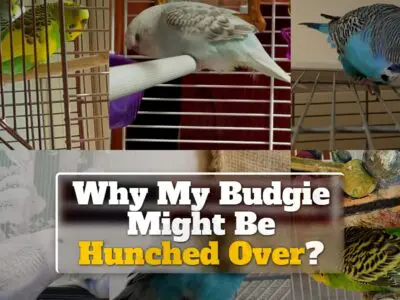Your budgie might have stopped eating or drinking due to factors like environmental changes, loneliness, stress, changes in diet, or physical health issues.
Ensure your bird has a quiet, comfortable environment, a consistent routine, and a nutritious diet with fresh food and water.
As a former budgie owner and bird lover, I have observed a common concern among bird enthusiasts that their budgies stop eating and drinking.
Based on my experience, reading, and observations, I’ve identified 15 reasons why your budgie may have stopped eating or drinking.
The purpose of this article is to provide helpful information and guide you in making informed decisions for the well-being of your pet parakeet.
Physical Health Issues
When your budgie refuses to eat or drink, various physical health issues can be at play.
Just as in humans, these problems can greatly affect their appetite and thirst.
It’s essential to keep a vigilant eye on your pet to notice any abnormalities, which may indicate underlying health issues.
1. Illness or Disease: Infections and Parasites
Among the most common reasons for a budgie’s lack of appetite are illnesses and diseases.
Bacterial, viral, or fungal infections can cause your budgie to feel unwell, leading to decreased food and water intake.
Likewise, internal parasites can wreak havoc on their digestive system, resulting in a similar effect.
If your budgie exhibits other symptoms, such as lethargy, ruffled feathers, or unusual droppings, it’s wise to seek veterinary assistance promptly.
2. Injury
Physical injuries, either visible or internal, can cause your budgie to lose interest in food and water.
These could be due to accidents such as falls or fights with other birds.
An injured budgie might exhibit signs of discomfort, difficulty moving, or an unusual stance.
If you suspect an injury, try to ensure your budgie’s comfort and get professional help immediately.
3. Respiratory Problems
Respiratory problems, another health concern for budgies, can affect their sense of smell and taste, leading to a loss of appetite.
These issues might arise from infections, environmental irritants, or underlying diseases.
Just like humans, budgies can face health issues as they age.
Older budgies may eat less, and their thirst may decline.
This behavior can be part of the normal aging process.
However, it’s also possible that an older budgie may be suffering from age-related diseases or discomfort that make eating or drinking difficult.
5. Liver or Kidney Problems
Organ-related health issues like liver or kidney problems can impact a budgie’s appetite and water intake.
Both the liver and kidneys play crucial roles in digestion and waste elimination.
If these organs are not functioning well, your budgie might feel unwell and refuse to eat or drink.
Symptoms like change in droppings, weight loss, and change in behavior may suggest organ-related health issues.
6. Gastrointestinal Problems
Issues related to the gastrointestinal tract, such as blockages, infections, or tumors, can lead to a loss of appetite in budgies.
They may find it difficult or painful to eat, leading to a decrease in food intake.
If your budgie seems to be straining, producing fewer droppings, or displaying any other signs of discomfort, seek veterinary care promptly.
Environmental Changes
The environment that your budgie lives in plays a significant role in its wellbeing.
Various environmental changes could potentially lead to behavioral changes, including diminished appetite and thirst.
Familiarizing yourself with these environmental factors can help you ensure a safe and comfortable living space for your budgie.
7. New Environment
Just like us, budgies can experience stress when placed in a new environment.
The unfamiliar sights, sounds, and smells can be overwhelming, leading them to temporarily lose interest in food and drink.
This behavior is normal as the bird adjusts to its new surroundings.
However, if your budgie continues to avoid eating or drinking for more than a day or two, it may require additional help in adapting or medical intervention.
8. Caged With Aggressive Birds
The dynamics of a shared living space can significantly impact a budgie’s behavior.
If housed with aggressive birds, a budgie may feel threatened and avoid the food and water dishes entirely to escape potential confrontations.
In such situations, it’s necessary to separate the birds and provide each with its own resources.
Monitor their interactions to ensure a safe and peaceful coexistence.
9. Toxic Exposure
Budgies are highly sensitive to toxic substances found in everyday household items.
Exposure to toxins such as certain types of plants, cleaning chemicals, or fumes from non-stick cookware could lead to a loss of appetite in budgies.
It’s crucial to keep your budgie’s environment free from such hazards.
Always be aware of where your budgie is and what it may be exposed to, ensuring its safety at all times.
Psychological Factors
Psychological factors can significantly impact a budgie’s eating and drinking habits.
A healthy state of mind is essential for maintaining a healthy appetite.
10. Stress, Anxiety, or Fear
Stress, anxiety, or fear can significantly impact a budgie’s eating and drinking habits.
Birds are sensitive creatures, and any change in their environment can lead to feelings of stress or anxiety.
A new pet in the house, a change in cage location, or even loud noises can cause them to become fearful.
When a budgie is scared or anxious, it may stop eating and drinking as a stress response.
It’s essential to monitor for any potential stressors and remove them where possible, helping your budgie return to its regular eating patterns.
11. Loneliness or Boredom
Budgies are social creatures and can suffer from loneliness or boredom if they don’t have enough interaction or stimulation.
Providing toys, interaction, and social opportunities with other birds or humans can help keep your budgie mentally stimulated and less likely to lose interest in food and drink.
Dietary Problems, Poor Diet
A poor diet or problems related to the diet can contribute to changes in your budgie’s eating and drinking behavior.
12. Old or Spoiled Food
Budgies will typically avoid old or spoiled food, leading to decreased food intake.
Regularly replacing your budgie’s food and checking for signs of spoilage can ensure that your budgie is getting fresh, healthy food.
13. Change in Diet: Unknown, New Foods
Just like humans, budgies can be hesitant to try unknown or new foods.
If you’ve recently introduced a new food into your budgie’s diet and noticed decreased eating, it may be due to this change.
Gradually introducing new foods can help your budgie adjust to the changes and maintain a healthy appetite.
14. Dehydration
Dehydration can affect a budgie’s appetite and overall health.
Ensuring your budgie always has access to fresh, clean water is crucial for preventing dehydration.
Hygiene Concerns
Maintaining a clean living environment for your budgie is crucial to prevent health issues and encourage healthy eating and drinking habits.
15. Dirty Food and Water Dishes
Dirty food and water dishes can be a significant deterrent for budgies.
Regular cleaning of your budgie’s dishes can help prevent bacterial growth and other health risks while encouraging your budgie to eat and drink regularly.
Faqs
Can My Budgie’s Eating or Drinking Habits Be Affected by Changes in Their Cage Mates?
Absolutely, changes in cage mates can cause stress in budgies.
If a new, aggressive bird is introduced, it may cause your budgie to feel threatened and alter their eating or drinking habits as a result.
Maintaining a peaceful environment with familiar cage mates can promote their health and well-being.
How Can a Change in My Budgie’s Diet Influence Their Eating or Drinking Patterns?
Any abrupt change in diet can distress your budgie.
If unfamiliar foods are introduced or if the food is old or spoiled, your budgie might stop eating.
A gradual introduction of new foods and ensuring freshness can help maintain regular eating habits.
Does Stress or Anxiety Affect My Budgie’s Food and Water Intake?
Yes, psychological factors such as stress or anxiety can have a significant impact on your budgie’s eating and drinking behaviors.
Ensuring a calm, quiet, and stable environment is essential to alleviate such issues.



